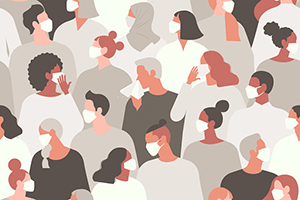People of any age with serious underlying health conditions are at greater risk for contracting the coronavirus, and cancer survivors are particularly vulnerable to becoming infected with COVID-19, since many cancer therapies can lead to immunosuppression. To reduce exposure to the virus, the Centers for Disease Control and Prevention has recommended avoiding nonessential doctor appointments. A study evaluating COVID-19–related preventive behaviors among cancer survivors—including behaviors related to canceling or postponing activities, specifically doctor’s appointments—has found that survivors, especially younger women and those living in rural communities—were more likely to cancel their doctor’s appointments. The study also found that non-Hispanic Black patients were less likely to cancel a doctor’s appointment compared to non-Hispanic White patients. The study by Islam et al is being presented at the AACR Virtual Meeting: COVID-19 and Cancer (Abstract S07-01).

Photo credit: Getty
Study Methodology
The study’s objective was to evaluate COVID-19 preventive behaviors among cancer survivors in the United States. The researchers also examined behaviors related to canceling or postponing activities, specifically doctor’s appointments.
The researchers analyzed data from 4,428 adults from the COVID-19 Impact Survey collected during the weeks of April 20–26, 2020, and May 4–10, 2020. They defined cancer survivors as those with a self-reported prior cancer diagnosis and used χ2 tests to compare COVID-19–related preventive behaviors among cancer survivors to other adults.
The team calculated prevalence ratios with 95% confidence intervals using Poisson regression and robust estimation of standard errors to estimate determinants of canceling doctor’s appointments among cancer survivors.
The cancer survivors in this study were mostly older than 60 (62%), female (53%), non-Hispanic White (62%), and urban residents (72%).
Study Results
The researchers found that the cancer survivors adhered to most recommended COVID-19–related preventive behaviors, and were more likely to maintain social distancing (92%, χ2 P = .005), wear a face mask (89%, χ2 P = .001), and avoid crowded areas (84%, χ2 P = .048) compared to other adults. Additionally, cancer survivors were more likely to cancel their doctor's appointments (44%, χ2 P = .001), but they were less likely to cancel other activities, such as work-related (20%, χ2 P = .001) and school-related (12%, χ2 P = .002) functions, even among those younger than 60.
KEY POINTS
- Cancer survivors, especially younger adults age 18 to 29, women, and those living in rural communities, were more likely to cancel their doctor’s appointment during the COVID-19 pandemic.
- Non-Hispanic Black patients were less likely to cancel a doctor’s appointment when compared to non-Hispanic White patients.
- Cancer survivors 60 and younger were more likely to cancel their doctor’s appointments, but less likely to cancel other social activities, including work and school-related functions.
Cancer survivors were more likely to report symptoms in the last 7 days, including muscle or body aches (χ2 P = .003). The proportion of patients with cancer that canceled doctor’s appointments due to COVID-19 rose from the month of April (35%) to May (52%). Younger adults age 18–29, female survivors, and rural cancer survivors were more likely to cancel their doctor's appointments, whereas non-Hispanic Black patients were less likely to cancel a doctor's appointment when compared to non-Hispanic White patients.
Clinical Significance
“Cancer survivors are adhering to recommended preventive behaviors. Cancer survivor’s continuity of care may be impacted by COVID-19, specifically young adults, females, and rural residents,” concluded the study authors.
Disclosure: For full disclosures of the study authors, log onto myaacr.aacr.org.

